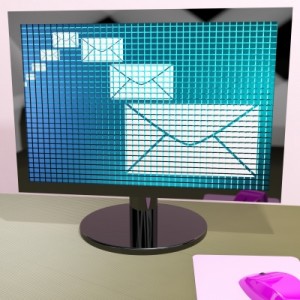Email etiquette 101

In a world with constant contact with friends and family it can be difficult to omit slang when writing a professional email Image courtesy of Stuart Miles at FreeDigitalPhotos.net
In a world full of emojis and abbreviations, it can be difficult to remember how to write a professional email. We spend so much time sending smiley faces to our friends that when it comes time to send an important email to the boss, it can be challenging to remember not to laugh out loud. Making mistakes like that, or accidentally forwarding a personal email to the entire department, can cause us to lose credibility in the workplace.
According to a study done by Kelton Global, over 90 percent of Americans spend 90 minutes on emails every day. When doing something that tends to take up that much of the typical workday, it’s important to get the technique down.
“Whether you like it or not, your emails reveal a lot about you to your colleagues and especially to your superiors,” writes Ravin Carr of mashable.com. “Think of the number of times we stereotype and react to people based on their ‘email behavior’: we run from the ‘ramblers,’ are exasperated by the ‘one-line repliers,’ hate the ‘always-keep-everybody-looped-in’ people and are irritated by the shoddy writers.”
With this in mind, it’s good to remember some tips for appropriate email etiquette.
- Keep it simple. Don’t use bigger words in order to sound smart. It’s always more efficient and effective to get straight to the point.
- Avoid forwarding emails without first briefly explaining what you want the recipient to see as important about the message.
- Be professional. Typically, the use of emojis and slang will be frowned upon. It’s alright to be conversational, but you need to balance that with sounding informed.
- Don’t structure emails like English papers. In business, it’s important to be efficient, and when your boss has to read a twenty-page dissertation before getting to your point, they’re not going to be happy. Always start with your point, and add backup points afterward.
- Don’t bring emotions into your work emails. According to the Business Insider, it’s better to say: “Are you open to a brief telephone call to discuss this?” than to say, “I would be delighted to speak with you personally about this and would love to tell you more.” The former gets straight to the point. The latter seems as if they’re trying to sell you something. Also, don’t express “fake concern.” The recipient will know. As written by Geoffrey James of the Business Insider, “either get to the point immediately or make a statement that’s specific to the recipient.”
- Always read back over what you’ve written. Double-checking your writing is going to help you ensure that your grammar and spelling are correct. Also, this gives you a chance to check the voice of the message and flow of your words. Most importantly, this gives you time to make sure that you haven’t marked “reply all.”








